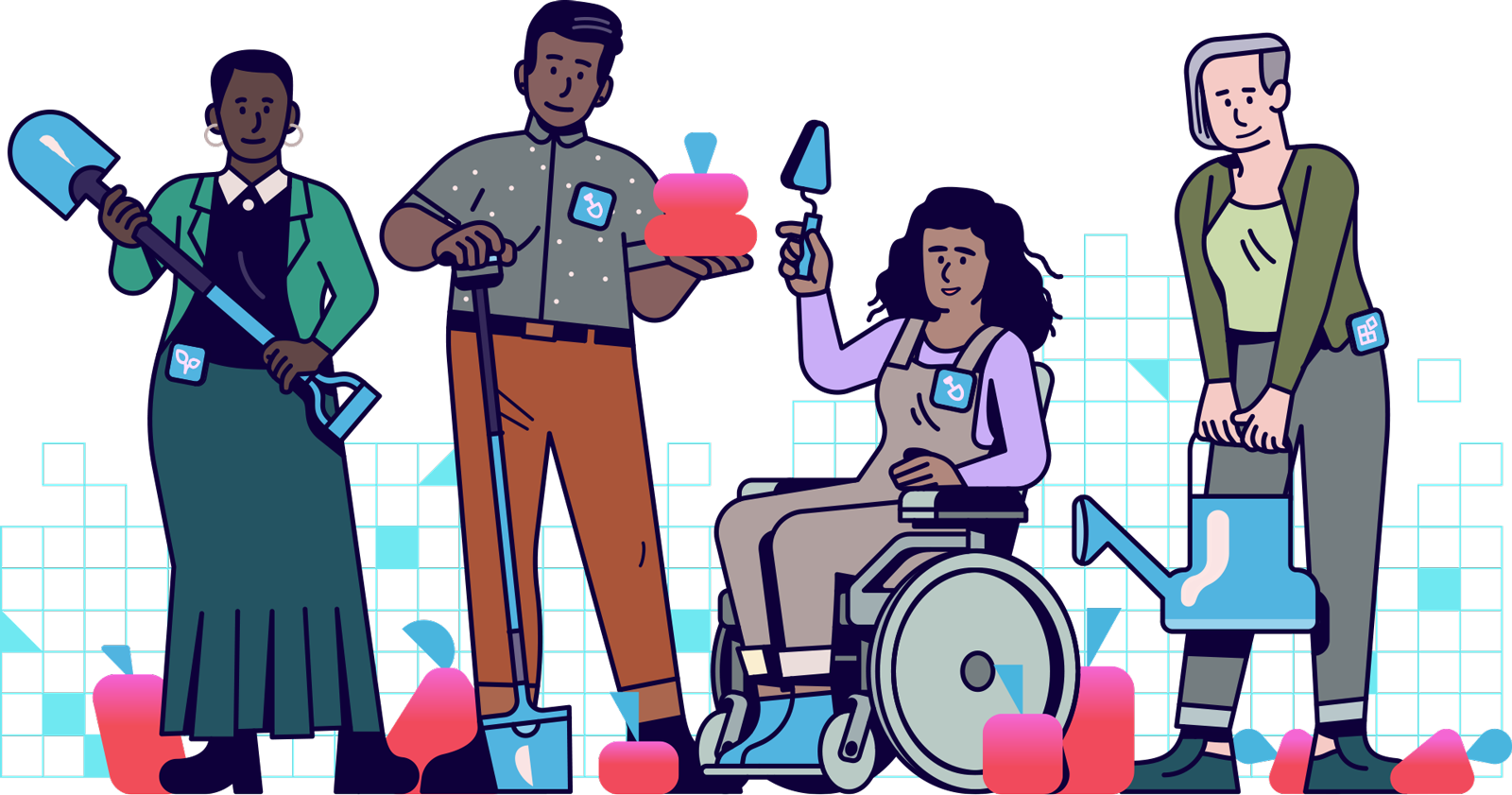
Ten tips for people who've just taken on responsibility for leading digital work in their charity. By Pauline Roche, a freelance writer and broadcaster.
When I was growing up in the West of Ireland in the 1970s, a new company started called Digital Equipment Corporation. It became known locally as ‘Digital’, and 600 people worked there when it opened.
These days, around the world, nearly everyone I know works at a variation of ‘Digital’, using technology and some of the culture, processes and business models of the internet-era to respond to people's raised expectations - to paraphrase digital expert Tom Loosemore.
But a lot of people have just fallen into it, and are now exploring what it means to be a digital lead for their charity.
If that’s you - if you’re starting out as the digital lead in your small charity, how is that going for you? Do you know where to start? Has someone in the organisation asked you to implement a new service using digital?
This article is intended to offer some general tips on how to make a success of doing that job, based on my own long experience of working with and supporting people who do exactly that.
Take a look at the guidance
If you’ve ever asked yourself “What do I need to know?” around digital, it can be a useful start to have a look at the government’s Essential Digital Skills Framework which has five categories: communicating, handling information and content, transacting, problem solving and being safe and legal online. Considering this framework might make you feel more confident about how good your skills are, and help you decide where you might want to improve yourself and your organisation.
Once you’ve asked yourself that, you might wonder “What does my organisation need to know?” and for that there are numerous digital maturity measurement tools such as the one from NCVO, one from SCVO, and a handy checklist written as a blogpost by Kayleigh Alexandra.
Don’t think you have to change everything
The language used by people who work around digital on a daily basis can be off-putting. Use of phrases like ‘digital transformation’ can feel overwhelming, like you are going to have to change everything about the organisation. As a person who is starting to explore the possibilities of technology, it can feel like you don’t know where to start.
Added to that, ‘doing digital’ is probably something you are doing on top of the job for which you were originally appointed. That job probably didn’t have ‘digital’ in the title or maybe even in the job description, and the last thing you need is a new worry.
In particular, when people start talking about digital transformation, it sounds as if you’re going to have to change all the systems in your charity.
But many systems are working. Maybe they’re not working well, but they are working in a way in which people in the organisation are comfortable with, and they are often not keen to change because that is time consuming. Time is one of the most precious currencies in small charities so change in a significant way, usually of systems, has huge implications for everyone involved.
Ask the so-called ‘stupid questions’
We can’t all remember how to do everything all the time, and when we’re under pressure, we forget some of the things we’ve been taught. The corollary of that is that the people teaching us about new stuff, especially digital, need to have oodles of patience, and be OK about repeating things, maybe several times over. This especially goes for techy people who join the boards of smaller charities – but that’s another post!
Build your networks
There are some really helpful networks on social media platforms such as Facebook, where groups like Third Sector PR & Comms and Fundraising Chat exist, and Twitter is not the cesspit some say it is. On the contrary, lots of people ask all kinds of technical questions on Twitter with the hashtag #lazyweb and get a variety of answers, many very useful.
Do some “discovery”
Discovery is one of those words that tech folk use to describe what they do at the start of a project, and includes identifying the parameters of a project, what people want to achieve (including people who will be or are using the service), what some of the main barriers are, and what needs to happen, change or stop before the project is able to proceed to the next stage. It’s a handy term to know and might be useful in some settings as you settle into your role.
Find your circle
The great thing about being a digital lead in a small charity is that you are not the only one on this journey. Your circle will comprise those people from whom you can get reliable advice, whose opinions you value and trust, people you feel whose values and experiences are more like yours than other people’s.
As the theme song to an old US comedy Cheers goes, there are places “where everybody knows your name, and they’re always glad you came” – these places are on, and of, the internet including Twitter and Facebook. I’d encourage you to get on those platforms, if you’re not already there, and find other people like you.
As the digital lead, you will get opportunities to find others in other organisations who are faced with similar challenges to you: trying to make something work in a way which is different, with technology that’s new or unfamiliar to people in your organisation, working with people at all levels who may be resistant to change.
Some of these people might not come from the same sector as you, by the way, and that’s OK too. Things that work in one sector can be transferable to another. I’ve met loads of particularly helpful people through attending meetups and unconferences
Don't be afraid
You’re probably not going to be able to break your computer unless you pour a hot sticky drink into it (please don’t try this) so don’t be afraid of trying out new software as long as you are confident about where it came from. You can uninstall it if it doesn’t do what you wanted it to or slows down the system. If you’re not sure, find someone in your circle to discuss it with before you install it. Or look it up on YouTube.
Think twice about bespoke
You may think that no existing system can deal with the vagaries of your organisation and that when you are considering some automation that you need to have something made from scratch, designed for your particular users.
The reality is that most off the shelf systems can be configured, or if necessary customised, to meet your requirements. Find a users group or community of interest online, a community of people who have some experience in the system you’re considering and ask them about the system before you commit your organisation to it.
Manage your senior leaders
Your CEO or the most senior person in your charity might not be ‘into’ digital and that can be an issue when you are trying to progress a digital project. It would be helpful for you (and them) if they were on social media and having exposure to others in a similar position. But any which way, it’s really important that you engage regularly with your CEO and senior leaders to help them understand what you are trying to achieve. There are often sessions on ‘Managing your manager’ at some of the many events I attend.
Take advantage of the help on offer
Most digital leads in small charities don’t have the time or inclination to read long reports, or attend day-long digital events – they need information and data they can understand, use or apply fairly quickly as their needs are so pressing and management and the board might feel they are not making best use of their time, certainly at the beginning of their work time as a digital lead.
How do you decide what is appropriate to attend, and which organisations to trust, when even people who have worked in the field for years have some difficulty with this?
You don’t want to be attending training and conferences which are irrelevant and a waste of time because they are not aimed at small charities.
Fortunately, there are some useful and thoughtful resources coming from organisations and individuals who want to help people in charities on their digital journey – I’ve listed a few I know here in alphabetical order:
BeMoreDigital - an online learning space built for people working in charities, NGOs and social enterprises.
Catalyst – a charitable initiative including agencies, funders and non-profits to help charitable organisations increase resilience and ability to respond to their mission using digital.
Charity Catalogue – an online directory aiming to help non-profits discover the best online tools and resources
Charity Digital – a charity established to help other charities accelerate their mission using digital technology, including by offering an IT donation scheme (previously known as Tech Trust) – they say “Our services improve digital awareness and access, connect charities to the digital expertise and talent they need, and raise the bar for digital skills and understanding for non-profit organisations of all kinds”
Digital Candle – an hour of free digital advice for charities from an expert in the question you ask, broad or niche - they say “Charities can get advice on any aspect of digital or digital marketing, from digital strategy to Google Ads and from remote service delivery to social media”
Digital WM News – a free monthly e-bulletin to increase digital inclusion, skills and knowledge in the voluntary, community and social enterprise sectors, with content from the internet compiled and curated by journalist Pauline Roche (me) – includes News, Events and Resources sections
Dovetail – a directory to help charities find a digital agency
Dr Tech show on YouTube – a show about getting and being online, started by internet evangelist the late John Popham and continued by his co-presenters journalist Pauline Roche (me again) and public sector IT manager Sweyn Hunter
Tech for good live – events and podcasts from a group of people in tech who believe that technology can be a force for social good
Don't worry about not knowing the answer
There is no expectation that you will have all the answers at the start of the journey. You're learning, and that's okay. As time goes by, you'll get there, and you'll find the right solutions for your charity.
Please keep in touch
If any of this information has helped you, or if it has made you ask more questions, I’d love to hear from you. I’m @paulineroche on Twitter.
I’d be especially pleased to hear if you’ve tried to get help from any of the places and resources I’ve listed. Has the help happened? Was it enough? What more do you need?

Support & services
Our free services help you make the right decisions and find the right support to make digital happen.
Learn what other non-profits are doing
39+ organisations share 50+ Guides to how they use digital tools to run their services. Visit Shared Digital Guides.



